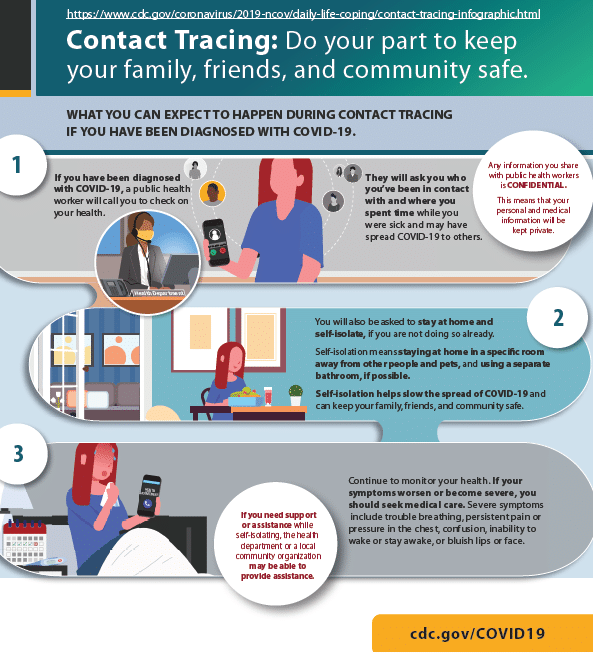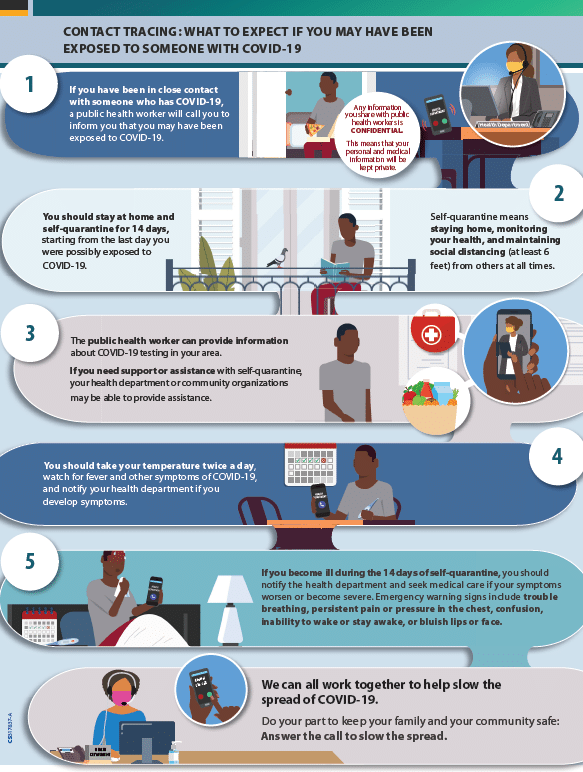In coordination with Coconino County, NAU has implemented contact tracing to help slow the spread of COVID-19 by notifying individuals of their possible exposure to the virus. Contact tracing starts with a case investigation of an individual confirmed positive for COVID-19.
What is contact tracing?
Once a positive case of COVID-19 has been identified, it is followed up with contact tracing, a procedure which identifies, monitors and supports a confirmed or probable case’s close contacts, or individuals, who have been exposed to and possibly infected with the virus. These individuals are the case’s “contacts,” and they will be notified of the exposure by a health department official.
Case investigations identify and investigate patients with confirmed and probable diagnoses of COVID-19. A health department worker talks with the patient to help them recall everyone they have had close contact with during the time they may have been infectious.
A person is considered to have close contact if they are within six feet of an infected person for at least 15 minutes. An infected person can spread COVID-19 starting about 48 hours (two days) before they experience symptoms or test positive for COVID-19, according to the CDC.
Why is contact tracing important?
Contact tracing is a mitigation strategy meant to slow the spread of COVID-19. It lets individuals know they may have been exposed to COVID-19 and should monitor their health for signs and symptoms of the virus. It also helps those who may have been exposed get tested and asks individuals to self-quarantine if they have COVID-19 or have been in close contact.
By identifying those who have been exposed, measures can be taken to self-quarantine, which will prevent additional exposure of the virus in the event that the virus was contracted during the exposure.

You may be contacted by a contact tracer if you have been diagnosed with a confirmed case of COVID-19 or if you have been in close contact with someone who has tested positive for COVID-19. A health department worker will call you asking for information about your recent contacts.
If you test positive, a public health worker may call to check on your health and ask who you have been in contact with and where you spent time while you were sick and/or infectious. Think about who you have been around and all the places you have been, including work, school, restaurants, stores and car rides.
What you share is confidential and your personal and medical information will be kept private. The contacts you give will only be notified of their exposure and not given your name.
Please note: Health department staff will not ask for money, Social Security numbers, bank account information, salary information or credit card numbers.
Once contacts have been identified, you will be asked to self-isolate if you are not already doing so. This means staying at home in a specific room away from other people and pets and using a separate bathroom if possible. Continue to monitor your health and seek medical care if symptoms worsen or become severe.

For additional information on contact tracing and COVID-19, visit the Centers for Disease Control and Prevention website.


